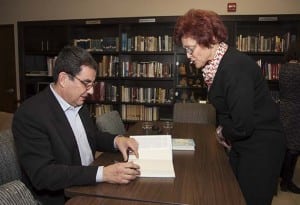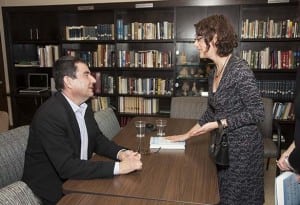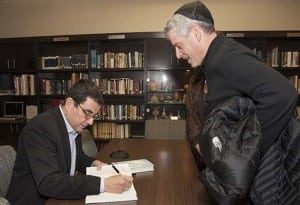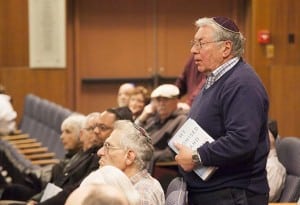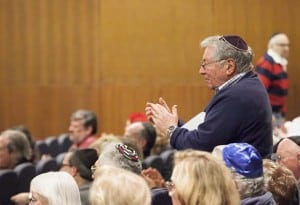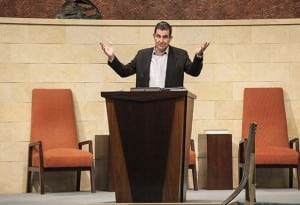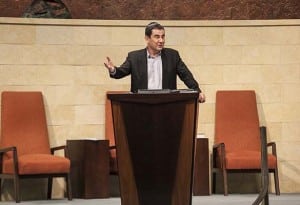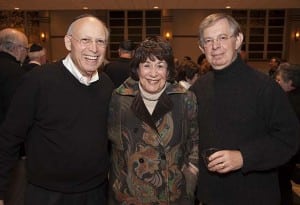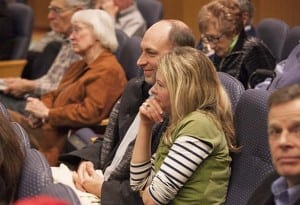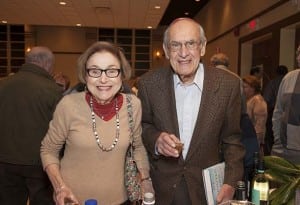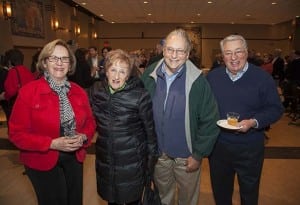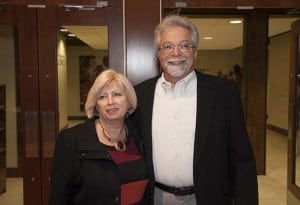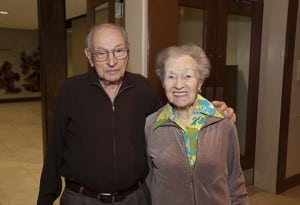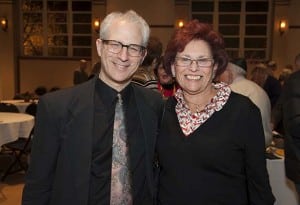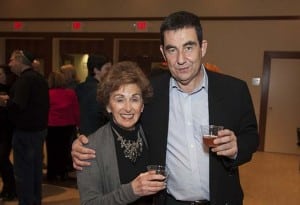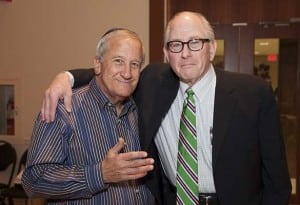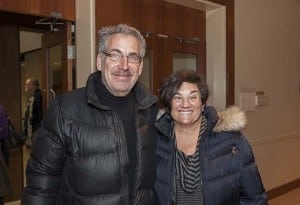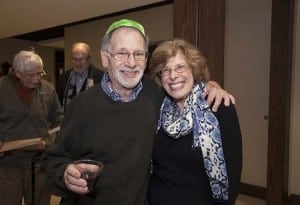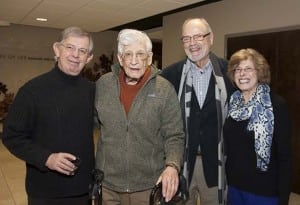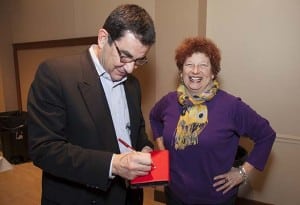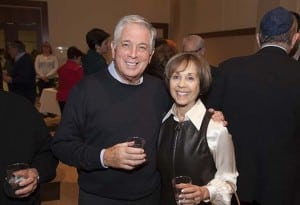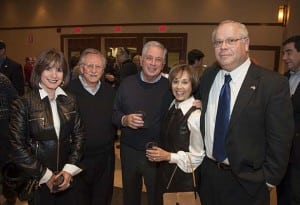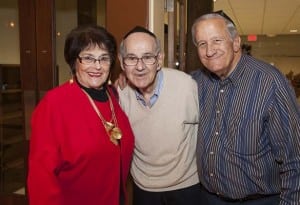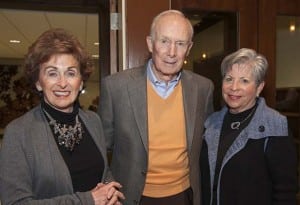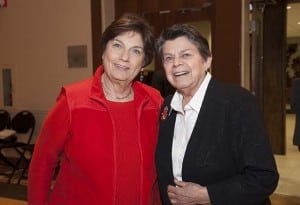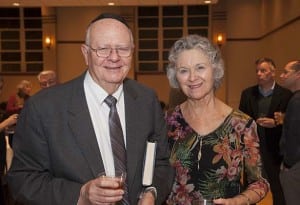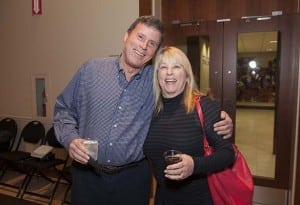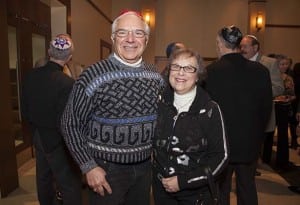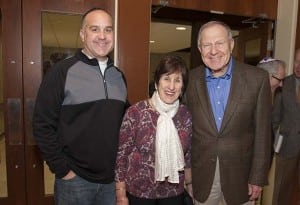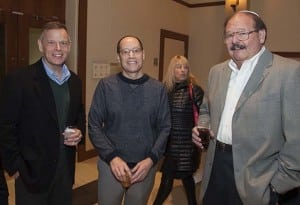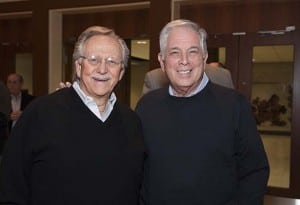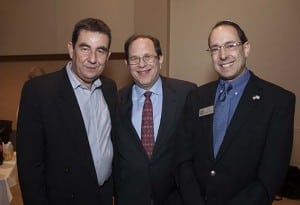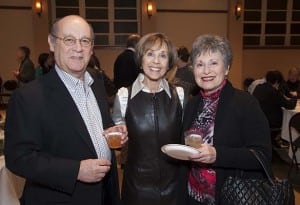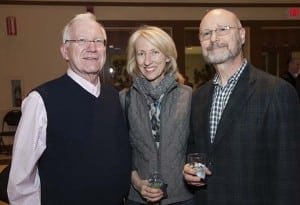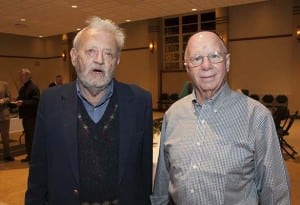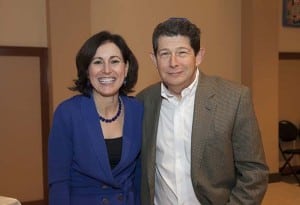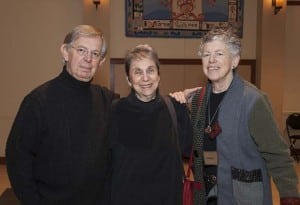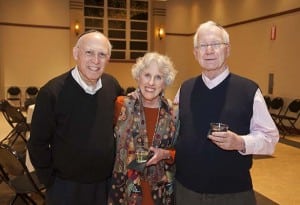(see full photo gallery below)
On December 7, he Louisville Jewish/Israeli Author Series brought Ari Shavit, the author of My Promised Land in to speak at Adath Jeshurun at an event sponsored by Adath Jeshurun and co-sponsored by Temple Shalom.
The series will continue on Friday, January 23, at the Jewish Community Center. The community is invited to participate in Kabbalat Shabbat services at 5:30 p.m. followed by dinner and discussion with Rabbi Danya Ruttenberg, author of Holy Frustration and Radical Amazement: Parenting as a Spiritual Discussion. The dinner is $18 for adults and $10 for children, and babysitting is available. It is sponsored by the JCC and Keneseth Israel.
The following day, Rabbi Ruttenberg will be the guest and featured speaker at Keneseth Israel for the Shabbat service and kiddush luncheon starting at 9:30 a.m. This program is sponsored by Keneseth Israel.
On Thursday and Friday, February 12 and 13, the University of Louisville Jewish Studies Department and The Temple are teaming up to bring Sayed Kashua, author of The Foreign Mother Tongue: Living and Writing as a Palestinian in Israel, to Louisville. On Thursday, he will speak in the Chao Auditorium in the University of Louisville’s Ekstrom Library at 3 p.m. and on Friday, he will speak at The Temple during Kabbalat Shabbat services at 7 p.m.
The Louisville Jewish/Israeli Authors Series is made possible by a generous grant from the Jewish Heritage Fund for Excellence.
Books, provided by Carmichael’s Bookstores, will be available for purchase at each event.
Ari Shavit
Ari Shavit, a writer for Haaretz and peace activist started by saying he knew about Kentucky’s bourbon but didn’t know about Louisville’s Jewish heritage. Seeing that there are Jews here, seeing Jewish Hospital and hearing about the community and history and how people here maintain Jewish life – that’s inspiring.
Shavit’s great-grandfather was a self-made wealthy man in London who left for Israel when he began to see that Europe was getting dangerous for Jews. He realized before the Holocaust that race-based anti-Semitism is more dangerous than religious-based.
When Israel war reborn, its land reclaimed and language revived, it ensured the survival of the Jewish people. “Israel gave us life,” he said. This was the Zionist narrative
Today, Israel is the most intimidated democracy in the world, Shavit said. There are 6.2 million Jews surrounded by as many as 1.2 billion Arabs. In 1967 Israel emerged victorious and proud, surviving an existential challenge and maintaining its narrative.
By the Yom Kippur War, Israel had become cocky and almost lost the war. Israel transitioned from the besieged to the besieger and its narrative cracked.
Today, Shavit said, no Israeli can be certain Israel will be here in 100 years or even 50. Israel can’t remain a Jewish State and a democracy without making peace and to make peace, and it must compromise on the settlements. At the same time, he said, the Palestinians must engage in building a state.
The summer of 2014 was an intense one, he said, and the issues are Hamas vs. Israel, the U.S. vs. ISIS and hate vs. Jews.
As Hamas battled Israel last summer, and missiles from Gaza reached Tel Aviv, Shavit’s young sons, Michael and David, asked him if the missiles would hit their house and can the Iron Dome be broken? He watched his sons’ ritual of survival and had to acknowledge that they will grow up under the threat. “Our enemies attack our civilians while they hide behind their own,” he said.
The world must recognize that Hamas is a Fascist organization, that attacks women, gays and others, and it has had some success, like the tunnels it dug under Gaza’s border with Israel. They were able to come to power, not because the population overwhelmingly supported their extremism, but because there was a power vacuum and they filled it.
At the same time, the U.S. faced its own traumas as ISIS beheaded hostages and Americans watched, helpless. When terrorists attacked on 9/11, the U.S. launched two wars in response. This country cannot live with the Middle East conflict as it is today. Shavit contends it must fix it or ignore it.
In addition, this summer, Jews in Europe are feeling threatened. The kind of “evil feelings” being expressed in Europe today, Shavit said, have not been heard since 1944.
Understanding this as today’s reality, Israel must reclaim the Zionist narrative and pass it on to the younger generation. People older than 70 remember the Holocaust, those older than 50 remember pre-1967 (the Six-Day War); but for those younger than 30, it’s a different world.
Iran poses an existential threat to Israel if it becomes a nuclear power, but it is not a threat to Israel alone. Iran is a threat to the region and the world. America needs assertive diplomacy on Iran.
The Arab terrorists growing out of the unrest started with the Arab Spring also are a threat to Israel and to the stability of the region. America can’t afford to align with the Shiites against the Sunnis because we don’t know which side will win against ISIS and there will be more extremists to come.
The Palestinian conflict also endangers the Jewish democratic state. Israel tried peace when it pulled out of Gaza and left the greenhouses in tact to provide the Palestinians with a foundation on which to build. It ended in war and the Palestinians destroyed the greenhouses.
Israel must also reengage its young people in its original vision. This summer, 74 young people were killed. “We ask our youngsters to risk their lives,” he said, “but do we do enough to ask them” to take that risk.
“We need a renewed Zionism,” he stated, “with a new vision and spirit to inspire the young to be on the right side of history.” During the 20th century, in the first half we lost every third Jew, he explained. In the second half we experienced sovereignty and the ideal diaspora.
“We must learn to love each other again,” he concluded. “To ensure a Jewish future, we have to see the challenges and act.
“Why Israel?” he asked. “There is a need. What is Israel? Vitality against loss. Will Israel continue? It depends on us.”
Sayed Kashua
The next author in the series to speak is novelist, journalist and screenwriter Sayed Kashua. He will talk about his life as a Palestinian-Israeli writer during a University of Louisville event February 12 and at the Temple on February 13.
Kashua’s free, public lecture and discussion about “The Foreign Mother Tongue: Living and Writing as a Palestinian in Israel” will begin at 3 p.m. February 12 in Chao Auditorium, Ekstrom Library. A book sale and signing will follow the talk at 4:30 p.m. UofL’s Jewish studies program presents the event, which also is part of the university’s Axton Reading Series.
Kashua’s lecture, “Living With Dual Identity,” will be at February 13 at 7 p.m. at The Temple.
Kashua, a visiting teacher at University of Illinois, earned the Prime Minister’s Prize for Literature in 2004 and the Israeli literary Bernstein Prize in 2011. He has published three novels: Dancing Arabs, Let It Be Morning and Second Person Singular. The film adaptation of the autobiographical Dancing Arabs opened the Jerusalem Film Festival last year and will be shown Saturday, February 14, at Village 8 Theaters as part of the Louisville Jewish Film Festival.
Kashua is also known for the popular groundbreaking Israeli TV show, “Arab Labor,” which provides a comedic look at a Palestinian journalist living in Israel and searching for identity. His satirical weekly personal columns in Hebrew run in the newspaper Haaretz. A 2009 documentary “Sayed Kashua – Forever Scared” chronicled his family life over seven years.
His latest novel, Second Person Singular triumphs as a tragicomedy composed of two intertwined stories tracing the lives of two Arab protagonists, illuminating their fraught condition as insiders and outsiders, the temptation to “pass” and hide one’s identity, and the painful struggle to create a life of meaning. Here Kashua examines life as a struggle against the destructive forces within all individuals, even as they grope with their society’s iniquities. Ultimately, Kashua’s entire oeuvre (books, television, and journalism) is distinguished by its unflinching critical portraits of both Arab and Jewish societies.
Although both talks are free, reservations are requested. Register for the UofL talk at http://sayed-kashua.eventbrite.com, and The Temple talk at https://jewishlouisville.org/event/louisville-jewishisraeli-author-series-sayed-kashua-2/. For reserved parking information, email Ranen Omer-Sherman, the Jewish Heritage Foundation for Excellence endowed chair in Judaic studies, at ranen.omersherman@louisville.edu.



